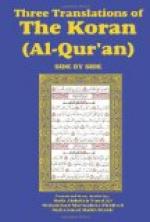Yet should we send a blast, and should they see their harvest turn yellow, they would afterwards shew themselves ungrateful.
Thou canst not make the dead to hear, neither canst thou make the deaf to hear the call, when they withdraw and turn their backs:
Neither canst thou guide the blind out of their error: in sooth, none shalt thou make to hear, save him who shall believe in our signs: for they are resigned to our will (Muslims).
It is God who hath created you in weakness, then after weakness hath given you strength: then after strength, weakness and grey hairs: He createth what He will; and He is the Wise, the Powerful.
And on the day whereon the Hour shall arrive, the wicked will swear
That not above an hour have they waited: Even so did they utter lies on earth:
But they to whom knowledge and faith have been given will say, “Ye have waited, in accordance with the book of God, till the day of Resurrection: for this is the day of the Resurrection-but ye knew it not.”
On that day their plea shall not avail the wicked, neither shall they again be bidden to seek acceptance with God.
And now have we set before men, in this Koran, every kind of parable: yet if thou bring them a single verse of it, the infidels will surely say, “Ye are only utterers of vain things.”
It is thus that God hath sealed up the hearts of those who are devoid of knowledge.
But do thou, Muhammad, bear with patience, for true is the promise of God; and let not those who have no firm belief, unsettle thee.
_______________________
1 See Sura lxviii. 1, p. 32.
2 By the Persians; probably in Palestine in the 6th year before the Hejira, under Khosrou Parviz. (Ann. 615. See Gibbon’s Decline and Fall, ch. xlvi.) The sympathies of Muhammad would naturally be enlisted on the side of the Christians rather than on that of the idolatrous fire-worshippers, with whom Islam had nothing in common.
3 This alludes to the defeat of the Persians by Heraclius, ann. 625. The Muhammadans appeal to this passage as a clear proof of the inspiration of their prophet. But it should be borne in mind that the vowel points of the consonants of the Arabic word for defeated in verse 1, not being originally written, and depending entirely on the speaker or reader, would make the prophecy true in either event, according as the verb received an active or passive sense in pronunciation. The whole passage was probably constructed with the view of its proving true in any event.
4 Comp. Psalm xc. 30, in the Arabic version.
5 The Talmudists apply the description of God of the sender of the rain to the divine command which shall cause the dead to arise. Taanith (init.).
6 Lit. from yourselves, i.e. either from the side of Adam or of human, and of no other kind of being. Beidh.
7 By worshipping idols conjointly with God.




